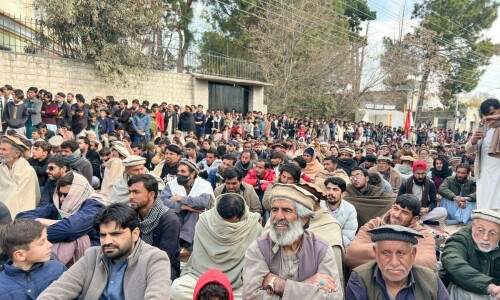ADD ‘or commerce?’ to the question in the title. With the examination season in full swing, to be followed by college admissions a few months later, this is naturally the question being asked by many young people aspiring to higher education.
Gone are the days when the choice was more or less evenly spread across all disciplines, with arts having a slight edge over the others. Individual aptitude, the job market and the capacity available in colleges determined the ultimate picture that emerged.
Today aptitude has very little say in the matter. When I passed my Matriculation from the Karachi Board 63 years ago, I was quite decided that my interest lay in studying the humanities and no one discouraged me saying they were a waste of time. Hence my knowledge of science is limited to the general science we were taught in school and what I learnt from reading Azim Kidwai’s science columns in this paper. I have never regretted my choice. I learnt more about coping with practical life and people.
Then things began to change. It was the job market and the concerted drive by the authorities to promote technology and the downgrading of liberal arts that shifted the trend. Business administration and commerce also became fashionable disciplines for the money they fetched, and were coveted by the cream of society.
Downgrading the social sciences suits the powers that be.
As a result, liberal arts, or social sciences as they are also called, have been reduced to the level of being the Cinderella of college education. I confirmed this by obtaining data from the Board of Intermediate Education Karachi. It was shocking for me, because I had not realised how low the humanities had sunk in the public perception. In 2018, 60,382 students appeared in the Inter Science (pre-medical, pre-engineering and general science group) examinations, 39,192 in Inter Commerce and only 14,041 in Inter Arts. Some others appeared privately but they were the leftovers who failed to gain admission in college or had opted to study on the sidelines as they worked.
I became aware of the devaluation of the social sciences a few years ago at a seminar on education where some participants disagreed with my view on the role of education in building a student’s character and personality and teaching him how to think. After the session I met Zarina Salamat who agreed with me and lamented vehemently the growing trend to downsize the social sciences. In fact, she told me that the Council of Social Sciences was founded to counter this trend and bring social scientists onto one platform.
Not many people notice that downgrading the social sciences suits the powers that be. Liberal arts encourage students not to accept what they are told without asking questions. Authoritarian rulers love a compliant population.
It is a pity that this trend towards rejecting the social sciences is on the rise. Humanities students are regarded as being non-serious and subjects like civics, history and education are dubbed as ‘soft’ disciplines that do not contribute to the development of society.
One positive outcome of this has been the reaction that has set in. A number of private universities that have sprouted in Pakistan over the past decades (74 out of a total of 177 universities) offer liberal arts. However, given their high fees, they are beyond the reach of the majority.
The fact is that today the main factor in the choice of subjects is the opening they provide for lucrative jobs. Arts do not land one as well-paid a job as science and commerce, so our experience shows.
So the overall picture for liberal arts remains quite bleak. This is worrisome because it is widely recognised that the study of humanities makes people think critically. The social sciences are the best route to a person’s mind and they can be most effective in bringing about behavioural changes in society.
The fact is that we need people who can communicate and articulate, have empathy and are creative. According to Linkedin, a site for professional networking, the most sought after by employers for 2019 are soft skills like ‘people management’ that include persuasion and collaboration.
Some universities in Pakistan are trying to moderate their science and business management disciplines by introducing liberal arts subjects in their programmes. We will have to wait and see whether this brings about desired results.
But the last word comes from a top recruiter. She says, “Doing something that really interests you is essential — because that’s when you’re going to do well. Financial success is not a good reason. It tends to be a very poor reason. Focus on doing the stuff that you love that you’ll be so enthusiastic about, people will want to give you a job. Then go and develop within that job.” So stop worrying if you are interested in the humanities. You will make a success of them.
Published in Dawn, May 10th, 2019












































